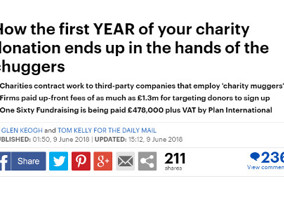On Saturday the Dail Mail decided to have a pop at charities for spending money on fundraising. Specifically, it complained that donor money was being spent on using third party fundraising agencies.
I think we have to be honest and say the Mail has done some good work over the years exposing shortcomings in fundraising practice.
This isn’t part of it.
This is an old, tired, familiar story, first reported at least 15 years ago and possibly longer, and never really kept a secret in the first place. Street fundraisers are paid money to recruit donors.
About a quarter of the money raised goes on fundraising. So what?
Charities need money. To get money you have to ask for it. If you are going to spend your life asking for money, you need to be paid.
Charities mostly are up front about this. Most charities are perfectly happy to explain how money is raised, and indeed it is now part of the code of practice that street fundraisers must explain how they are paid.
This is a classic case of the papers and the public getting angry about how charities have to be run in real life, as opposed to how everyone would like them to be run. While it would of course be beautiful if the public supported charities out of the goodness of their heart, the truth is they do not do so. Everyone believes, deep down in their hearts, that they are good people and will do the right thing without prompting, but actually, most of us could do with a little help.
I think what annoys me most about this is that it contains no information the Mail couldn’t just have taken from its last article on the subject, a few years ago.
It’s interesting that charities haven’t pushed back as strongly against this as the RNLI did against the latest hatchet job, but I think this is because fundraisers weren’t so much outraged as puzzled as to why this information was deemed to be news. I think I would have advocated a little more outrage, if I’m honest, just to ram the point home. I thought the RNLI’s response was an excellent lesson.
The Mail is still watching
Still, this story does serve one purpose. It reminds fundraisers that the Mail is still watching.
This is no bad thing, in and of itself. If the public need a little outside help to make sure they give well, maybe charities sometimes need a little outside help to make sure they ask well. The Daily Mail is not exactly the help anyone needs, but it’s what we’ve ended up with. Perhaps we should try to make a virtue out of necessity.
There’s obviously some evidence that smaller charities also have concerns about fundraising costs. There were a few on Twitter at the weekend saying “We don’t do this, why should big charities?” and complaining about how fundraising is becoming commercialized, and a small number of organisations dominate the asking market.
If you’re under attack from the Daily Mail, it may be you may be doing something right. But if you're under attack from a small charity for kids with a rare disease, you might want to think again.
The truth is that fundraising costs are rising as a proportion of donated income. Donated income itself is pretty static, relative to donors' overall income, and I think we’ve shown by now that the sector can’t grow the pot very much; each charity can just compete for a bigger share. Given that fact, we must be careful about how much is spent on ramping up competition, rather than on end causes.
Charities have already taken some good steps to address that particular issue. Setting up the Fundraising Regulator was a good step - although it needs to be strengthened if it is to succeed. Site management agreements are a good step, because they limit how often street fundraisers appear on each high street, and act to stop donor fatigue. Better compliance with data protection has been a good step, because it should stop too much pressure being brought to bear on a particular individual.
I’m optimistic that the next good step in this direction will be when the Institute of Fundraising becomes a chartered institute.
So it’s worth the biggest charities getting together to keep costs under control, because doing so will help avoid stories like this. Because there’s still more to be done. Charities need to sit down together and discuss this subject, and fundraisers must be the leaders of that solution.
|
Related articles













